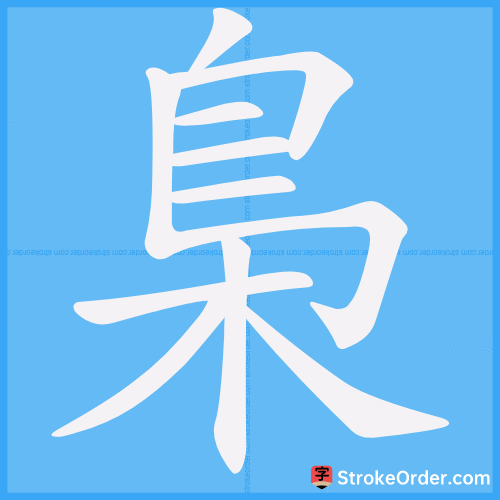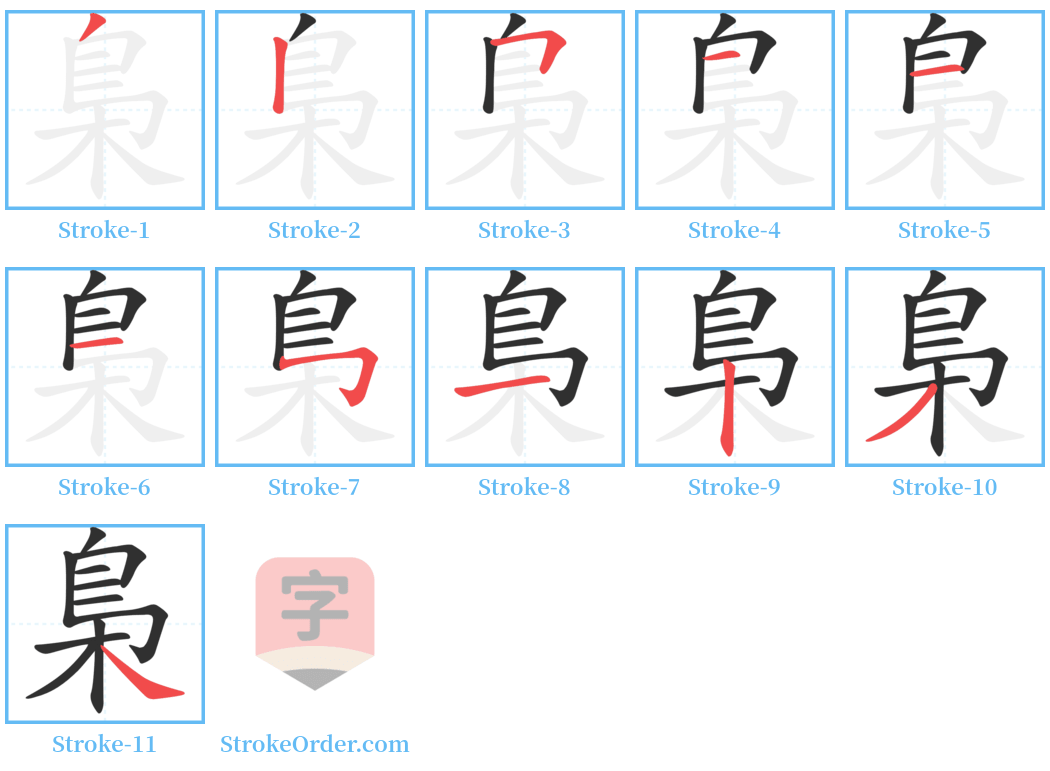梟 Stroke Order
Animated Stroke Order of 梟

Stroke Order Diagrams for 梟

Step-by-Step Handwriting Guide for 梟

Learn to Write Chinese Characters with Video Tutorials
Watch the video of writing the Chinese character "梟", learn the correct stroke order (笔顺) of the character "梟", and master the standard way of writing the character "梟".
Free Printable Handwriting Practice with Stroke Order: 梟
Printable Writing Practice Worksheet of "梟" in Portrait Orientation (Tian Zi Ge)

Printable Writing Practice Worksheet of "梟" in Landscape Orientation (Tian Zi Ge)

Information of 梟
Pinyin
xiāo
Radical
木
Strokes
11 strokes
Usage
★★★
Definition
brave / owl / strix uralensis
梟
梟 xiāo
[名]
1. 鳥名。貓頭鷹一類的鳥。鳥綱鴟鴞科各種鳥的泛稱。也作“鴞”。
(Bird name. A type of owl. A general term for various birds in the Strigidae family. Also known as "owl".)
2. 驍勇;豪雄;不馴順。
(Fierce and brave; heroic; untamed.)
3. 魁首,首領。
(Leader, chief.)
4. 舊時指私販食鹽的人。
(In ancient times, referred to people who smuggled salt.)
5. 斬首懸以示眾。
(Behead and display publicly.)
6. 頂端;山頂。
(Apex; mountain peak.)
7. 古代博戲的勝彩名。么為梟,得么者勝。
(An ancient gambling game; "one" is the winning color "xiao", and rolling a "one" wins.)
8. 等;級。
(Rank; grade.)
9. 通“撓”。淆亂。
(Same as "disturb". To confuse.)
10. 姓。
(Surname.)
[義]
【本义】:指一種惡鳥,捕捉後懸頭樹上以示衆
(Original meaning: Refers to a bad bird, captured and its head hung on a tree to show the public.)
【造字法】:會意。从鳥,頭在木上。
(Character formation method: Ideographic, comprising "bird" and "head on wood".)
[名]
1. 貓頭鷹 ([En.] owlet)
(Owl.)
【引】
1. 《說文》:梟,不孝鳥也。日至捕梟磔之,從梟頭在木上。
(From "Shuowen": "Xiao" refers to an unfilial bird. During the day, the Xiao is captured and its head hung up.)
2. 《漢書·郊祀志》:用一梟破鏡。
(From "Han Shu": Using one Xiao to break the mirror.)
3. 《詩·大雅·瞻卬》:爲梟爲鴟。
(From "Shijing": To be Xiao and to be Chibo.)
4. 《漢書·司馬相如傳》:射遊梟。
(From "Han Shu": Shooting and playing Xiao.)
5. 《漢書·郊祀志》:鴟梟羣翔。
(From "Han Shu": The Chibo and Xiao swarm and fly.)
6. 梟鳴鬆桂枝。——唐· 白居易《凶宅》詩
(The Xiao calls out among the pine and laurel branches. — Bai Juyi, Tang Dynasty.)
【例】
又如: 梟奴(兇狠的奴僕); 梟獍(梟鏡。相傳梟為食母惡鳥,獍為食父惡獸。比喻兇惡忘恩的人)
(e.g. Xiao slave (cruel slave); Xiao beast (Xiao is a bird that takes its mother, and the beast takes its father. Metaphor for ungrateful and wicked people.))
[名]
2. 舊時指私販食鹽的人 ([En.] smuggler).
(In ancient times, referred to people who smuggled salt.)
【例】
如: 鹽梟
(e.g. salt smuggler.)
[名]
3. 使人娛樂、愉快或歡欣的某種方法與手段 ([En.] amusement).
(A method or means of entertainment or joy.)
中國古代的一種遊戲,叫「樗蒱」(相當於現在的擲骰子),一爲梟,六爲盧。
(An ancient Chinese game called "Chuo Zhu", similar to modern dice, with "one" as Xiao and "six" as Lu.)
【例】
如: 梟盧
(e.g. Xiao Lu.)
[形]
1. 「梟」假借爲「驍」,最勇健 ([En.] fierce and ambitious)
("Xiao" also serves as a borrowing form for "Xiao", meaning the most brave.)
【引】
1. 《史記·留侯世家》:且太子所與俱諸將,皆嘗與上定天下梟將也。
(From "Shiji": The princes and commanders have all participated in the establishment of a fierce and brave army.)
2. 《淮南子·原道》:爲天下梟。
(From "Huainanzi": To be the fiercest and bravest in the world.)
3. 梟爲最勇健也。——《漢書·張良傳》注
(Xiao is the bravest. — Annotation from "Han Shu".)
【例】
又如: 梟惡(勇猛兇惡); 梟張(猖狂;放肆); 梟將; 梟騎(勇猛健壯的騎兵)
(e.g. Xiao evil (fierce and brutal); Xiao Zhang (rampant; outrageous); Xiao general; Xiao cavalry (fierce and strong cavalry).)
[動]
1. 懸頭示眾 ([En.] behead and put before the public)
(To behead and publicly display.)
【引】
1. 《漢書·高帝紀》:梟故塞王欣頭。
(From "Han Shu": Xiao had previously beheaded Wang Xin.)
【例】
又如: 梟示(梟斬。砍頭懸掛示眾); 梟夷(誅殺淨盡); 梟除(誅殺清除)
(e.g. Xiao display (to behead and hang it publicly); Xiao Yi (to execute completely); Xiao remove (to behead and eliminate).)
2. 淆亂 ([En.] disturb)
(To disturb and confuse.)
【引】
1. 《荀子·非十二子》:飾邪說,文奸言,以梟亂天下。
(From "Xunzi": To decorate evil sayings and craft treacherous words, disturbing the world.)
3. 昭示;宣佈 ([En.] declare)
(To declare and announce.)
【引】
1. 《說岳全傳》:可再作一判文,以梟秦檜父子夫婦之過。
(From "Shuo Yue": One can create another ruling to declare the sins of Qin Hui and his family.)
4. 擋;推 ([En.] keep off)
(To keep off; to push aside.)
【引】
1. 《說岳全傳》:嶽大爺又把槍輕輕一舉,將梁王的刀梟過一邊。
(From "Shuo Yue": Master Yue gently raised his gun and pushed aside Liang Wang's sword.)
5. 撩 ([En.] hold up)
(To hold up.)
【引】
1. 《官場現形記》:梟開帳子,讓張聾子親自來看。
(From "Guan Chang": Xiao opened the tent and let Zhang Longzi come see for himself.)